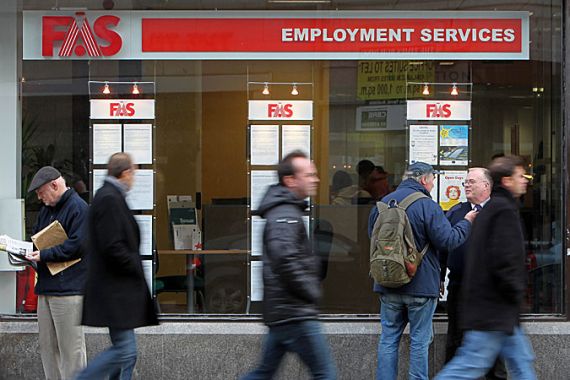Irish could see ‘substantial loan’
Head of central bank says the country could receive tens of billions of dollars in a joint EU-IMF loan.

| Al Jazeera’s Alan Fisher reports how a bailout could affect Ireland’s identity |
Ireland could receive tens of billions of dollars in a “very substantial” loan, the head of the country’s central bank has said, as a team of international financial experts arrive in Dublin.
Patrick Honohan said that talks with the joint mission from the European Commission, the European Central Bank and the International Monetary Fund on Thursday could lead to a loan being made available.
Keep reading
list of 4 itemsBehind India’s Manipur conflict: A tale of drugs, armed groups and politics
China’s economy beats expectations, growing 5.3 percent in first quarter
Inside the pressures facing Quebec’s billion-dollar maple syrup industry
“We’re talking about a very substantial loan for sure – tens of billions, yes,” he told the state broadcaster RTE radio, acknowledging that there had been substantial outflows of funds from the Irish banking sector since April.
The team will examine Ireland’s financial situation amid fears it is set to become the second eurozone economy after Greece to be bailed out this year.
Dublin’s borrowing costs have spiralled since late October as concerns about the banks’ growing liabilities and EU moves to create a system for restructuring stricken euro zone states’ debts unsettled investors.
“To some extent the market is anticipating [a bailout], but once the announcement is made I think we will see these spreads come in,” Nick Stamenkovic, a bond market strategist at RIA Capital Markets in Edinburgh told the Reuters news agency.
‘Threat to sovereignty’
However Ireland’s leaders have still not committed to accepting an aid package.
The government is concerned about how conditions attached to a bailout might affect domestic issues, such as its rate of corporation tax, which is one of the lowest in Europe.
Alan Fisher, Al Jazeera’s correspondent in Dublin, said the loan could threaten Ireland’s sense of national identity, one reason the government may be reluctant to take up the offer.
“[Irish] Nationalism is underpinned by the fact that it has financial security, financial stability and financial independence,” he said.
“There was a speech made in 1957 by the-then prime minister who really set the tone for that. So to give up any sort of sovereignty over their finances is to give a little bit away of what it means to be Irish.”
He added that the government could be holding out in order to strengthen their negotiating position with the EU and the IMF.
“The Irish govt might be playing a game of high-stakes poker here saying: ‘we’re not going to accept the bailout unless we have more control over what happens with our economy, that we don’t give sovereignty to the EU and IMF’.”
France has said Ireland may have to raise its 12.5 per cent corporation tax rate in return for the assistance package.
Christine Lagarde, the French finance minister, said Irish business taxation was abnormally low by European standards, while income taxes were broadly in line with the EU average.
Higher-tax countries, including Britain, Germany and France, have long seen the Irish rate as a form of unfair competition.
The EU is concerned that Ireland’s weakness could lead to a contagion which could drag down among other heavily indebted economies in the 16-nation eurozone such as Spain and Portugal.
Britain, which is not a eurozone member, said Wednesday it was looking at “a number of different avenues” to help Ireland’s devastated banking sector.
George Osborne, the finance minister, said London was prepared to assist because the British and Irish economies were so closely intertwined.